.avif)
Starting a private label business has become one of the most accessible ways for new and established entrepreneurs to launch products without managing complex production in-house.
Many new entrepreneurs exploring what are private label products often want clarity on how third-party manufacturing connects with branding and distribution.
In this guide, you’ll learn what a private label is, how the manufacturing relationship works, and what steps are involved in bringing a branded product to consumers.
What Private Labeling Actually Is: Core Business Principles and How the Model Works
Private label is a model where products are made by a manufacturer but sold under a retailer’s brand. It allows businesses to introduce quickly, reduce operational work, and maintain full control over branding and pricing while keeping costs low.
Below are the core business concepts that define how this works and support a clear definition of private label for businesses exploring this model:
1. Third-Party Manufacturing with Brand Ownership
These products are manufactured by a third-party company, but all branding rights and consumer-facing elements belong to the retailer.
This structure lets businesses roll out high-quality private label products without having to invest in factory equipment, specialized labor, or technical formulation knowledge.
By collaborating with expert manufacturers, businesses gain access to professional production standards while focusing their resources on marketing, sales, and overall product experience.
- The manufacturer handles formulation, sourcing, and production
- Retailer owns branding, packaging, and positioning
- Lowers entry barriers by removing manufacturing costs
2. Product Customization and Differentiation
.avif)
One of the biggest advantages is the ability to customize. Businesses can choose between ready-made blends, partially customized versions, or fully bespoke products depending on their budget and differentiation goals.
This flexibility allows businesses to develop products that resonate with their audience while maintaining shorter development timelines and lower costs than building products from scratch.
- Ready-made formulas enable fast launches
- Semi-custom options offer moderate differentiation
- Full customization creates unique, market-specific products
3. Brand Control and Market Positioning
It gives businesses complete control over how the product is presented to consumers. This includes packaging design, label messaging, color schemes, product claims, and overall brand voice.
By owning every element of the consumer-facing experience, private label companies can create a consistent identity across their product line, strengthen business loyalty, and establish a clear position within their niche.
- Brands choose packaging, design, and product claims
- Pricing decisions remain fully in the retailer’s hands
- Supports strong brand identity and customer loyalty
4. Streamlined Production, Fulfillment, and Scalability
Because production is outsourced, businesses can scale faster and operate more efficiently. Manufacturers manage quality control, regulatory compliance, ingredient sourcing, and batch consistency, ensuring products meet safety and performance standards.
Retailers can then choose the most efficient fulfillment method, whether wholesale, warehousing, or direct-to-consumer shipping, based on their business model and growth stage.
- Manufacturers manage quality, safety, and consistency
- Retailers choose flexible fulfillment and shipping models
- Eases scaling without added operational burden
How Is a Private-Label Product Different From White-Label?
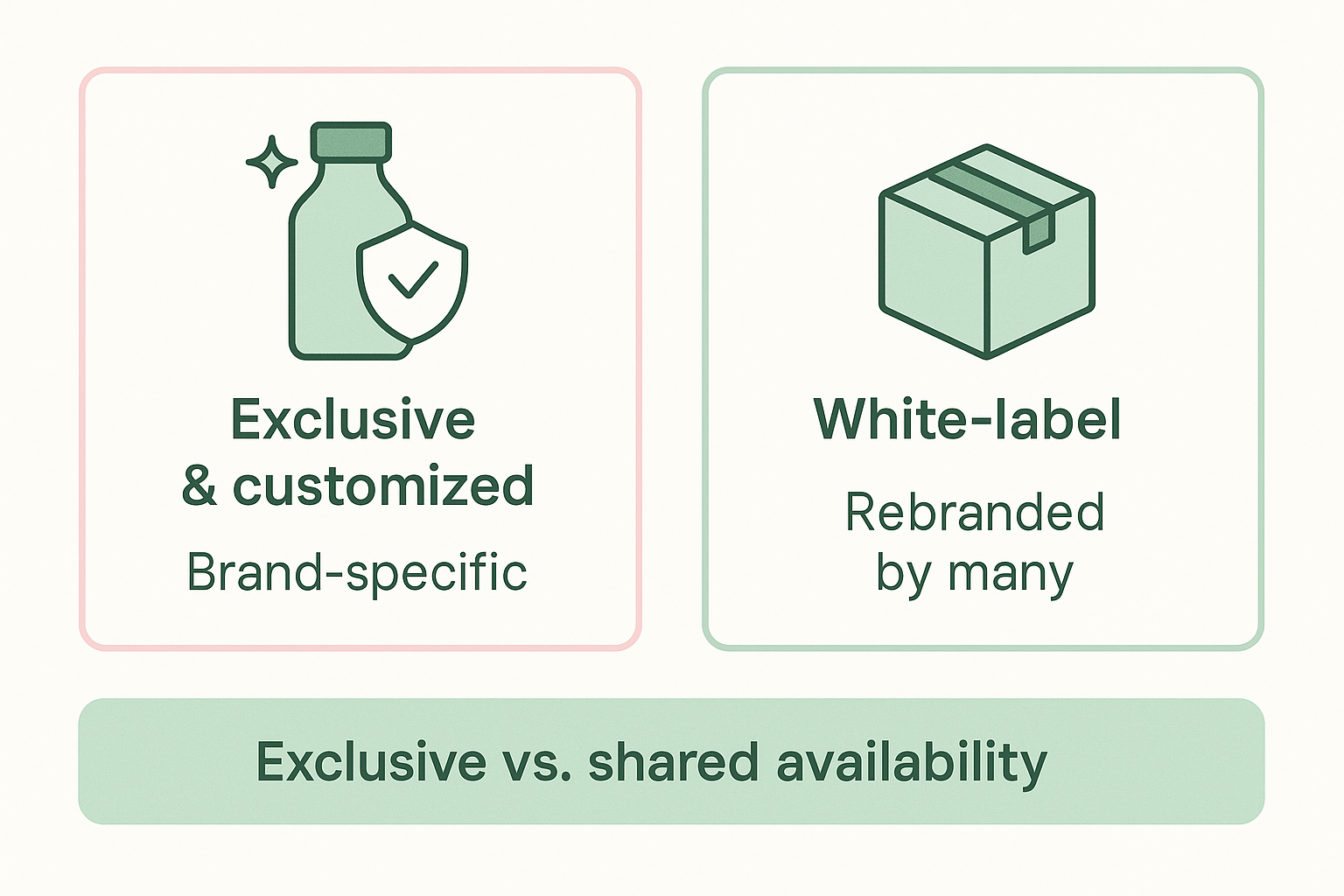
While private label and white label models are often grouped, they function differently in ways that can significantly impact branding, pricing, and long-term growth.
The core distinction lies in ownership, customization, and how exclusively the product is offered within the industry.
Understanding these differences helps businesses choose the model that best aligns with their goals, resources, and desired level of control.
Private Label Products
Private label products are created by a manufacturer specifically for one retailer, allowing that retailer to shape the composition, packaging, and branding to match their unique vision.
This means the final product reflects the brand’s identity, positioning, and buyer expectations rather than a generic product.
Because these products are exclusive, competitors cannot sell the same product in the same form. This exclusivity strengthens differentiation and allows businesses to build stronger recognition and loyalty over time.
It is often chosen by businesses focused on long-term brand development rather than quick target audience entry.
Key traits of these products:
- Developed for one brand with tailored customization
- Exclusive formulas, packaging, and branding elements
- Stronger differentiation and deeper control over product direction
White-Label Products
White-label products are mass-produced by a manufacturer and sold to multiple retailers, who then apply their own branding. While this model offers speed and simplicity, the underlying product remains largely the same across all brands.
Because white-label products are shared, differentiation relies heavily on marketing, pricing, and presentation rather than the product itself.
This approach is often used by businesses testing new markets, launching quickly, or operating with limited upfront investment.
Key traits of white-label products:
- The same product is sold to many brands, each applying its own branding
- Minimal to no customization beyond packaging and design
- Faster to launch, lower cost, and ideal for testing markets
Key Difference Explained
Private label is about exclusive customization and brand control, while white-label is about speed, simplicity, and shared product availability.
Businesses seeking unique products typically choose this, whereas those wanting quick, low-risk entry often use white label.
How Private Label Works
It works through a collaboration between a retailer and a manufacturer, where the manufacturer produces the product, and the retailer sells it under their own brand.
Instead of managing factories, sourcing materials, or handling production internally, businesses rely on an experienced manufacturing ally to create the product to defined specifications.
This model removes the need for in-house production, allowing businesses to introduce products faster and allocate more time and resources to branding, marketing, and customer experience.
By separating production from ownership, it creates a more flexible and scalable path to customers.
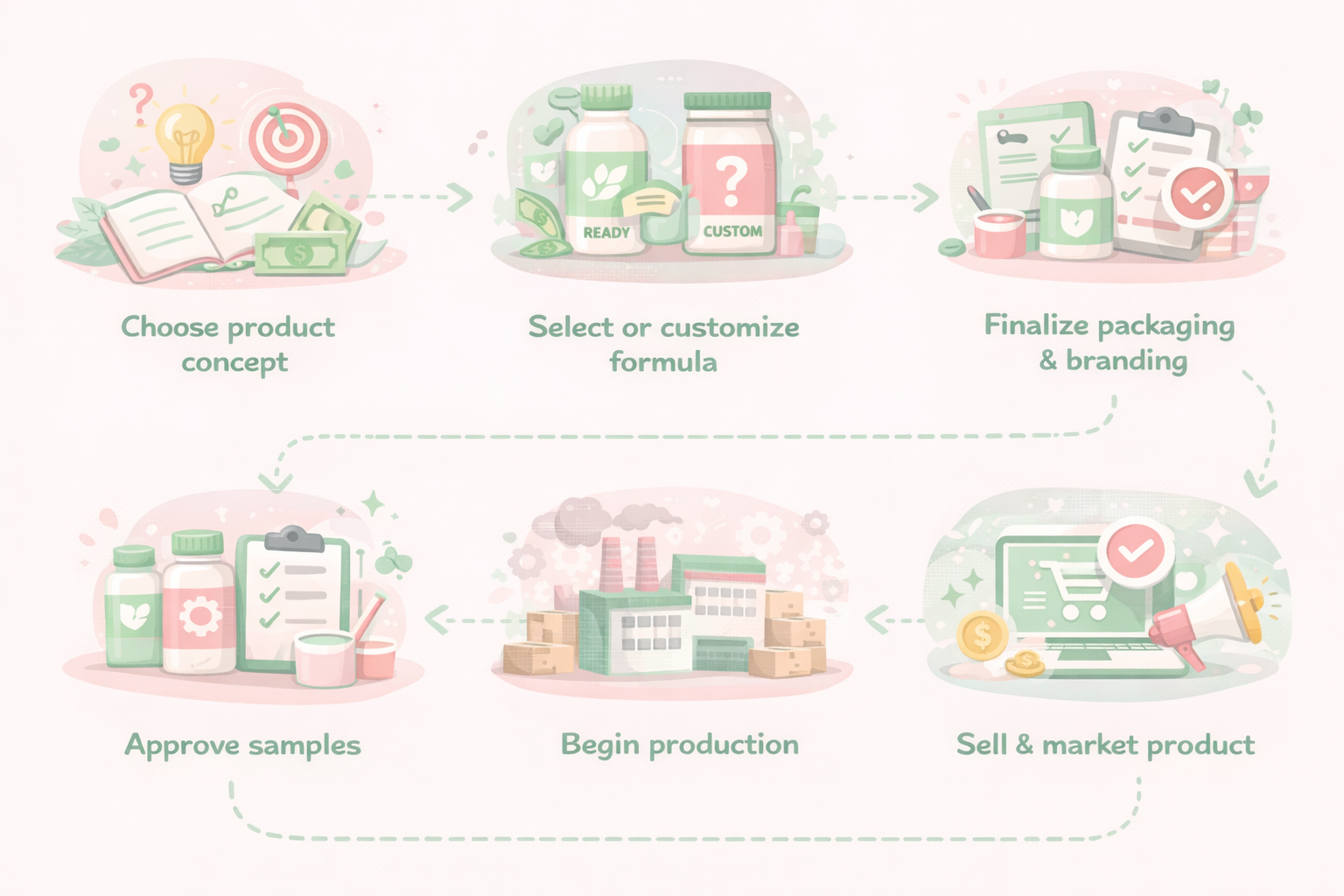
The process follows a clear sequence that takes a product from concept to market-ready launch.
Each stage builds on the previous one, helping ensure the final product aligns with quality standards, goals, and buyer expectations. Below is a simplified breakdown of how the process comes together.
1. Choose a product concept
The retailer begins by selecting a product type, defining the target audience, and identifying a target audience opportunity.
This stage often includes researching demand, evaluating competitors, and deciding how the product will be positioned within the brand’s existing lineup.
2. Select or customize a formula
Manufacturers typically offer ready-made formulas for faster roll outs or custom options for brands seeking greater differentiation.
Retailers choose the option that best fits their budget, timeline, and brand strategy while ensuring the product meets quality and regulatory standards.
3. Finalize packaging and branding
Labels, packaging materials, product claims, and visual design are developed to reflect the retailer’s brand identity. This step plays a major role in how consumers perceive the product and helps ensure consistency across the brand’s line.
4. Approve samples
Before full production begins, retailers review product samples to confirm quality, performance, and overall presentation. This approval step helps identify any issues early and reduces the risk of costly changes later.
5. Begin production
Once samples are approved, the manufacturer proceeds with production using standardized processes and quality controls. This ensures consistency across batches and supports reliable fulfillment as demand grows.
6. Sell and market the product
After production, the retailer takes full responsibility for promotion, distribution, and audience engagement. This includes managing sales channels, promoting the product, and gathering consumer feedback to guide future improvements.
The Ins and Outs of the Private Label Supply Chain
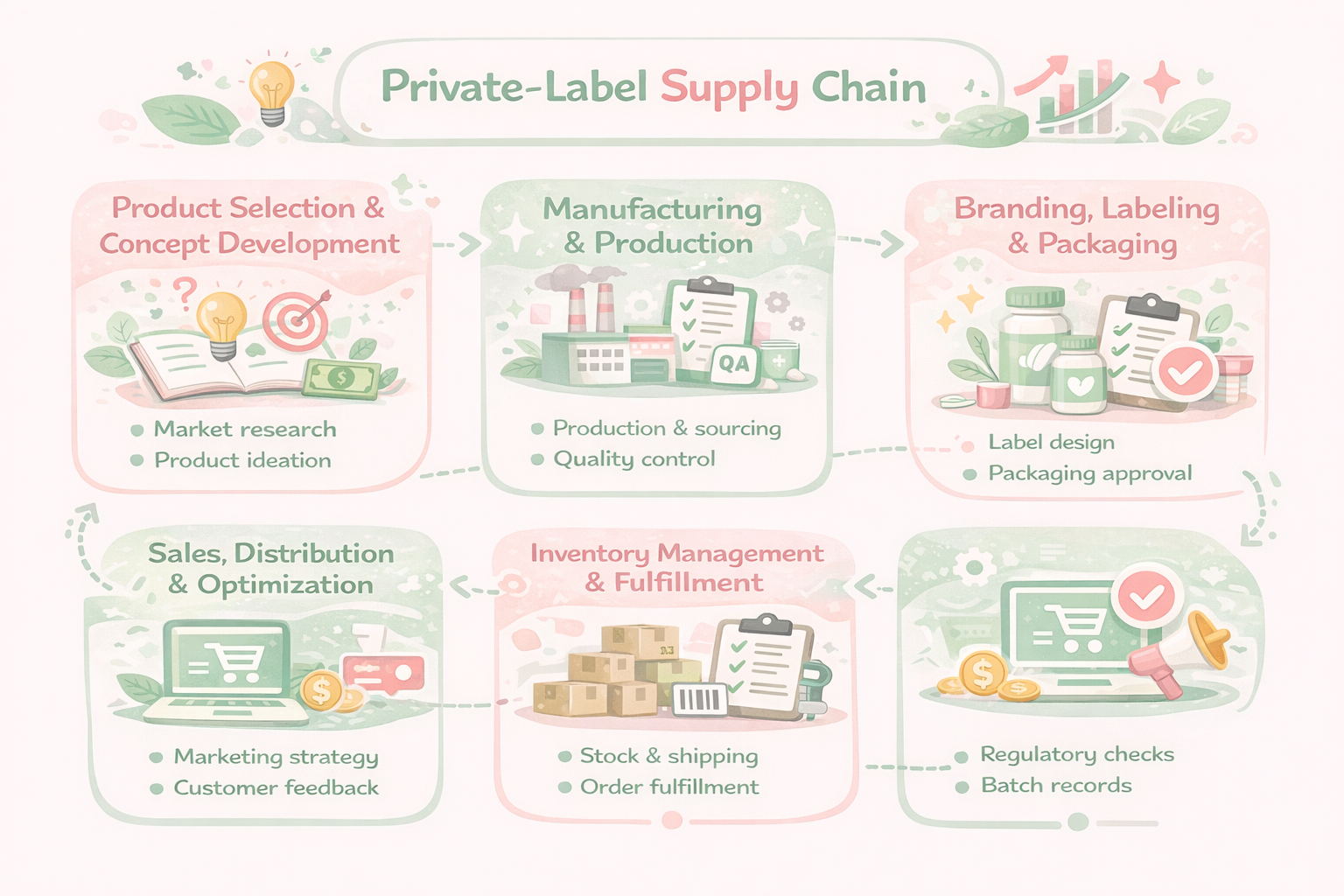
The private label supply chain brings together product development, manufacturing, branding, and fulfillment to help brands launch efficiently without managing production in-house.
Product Selection and Concept Development
The process begins with choosing a product concept based on market demand, target audience, and brand positioning. At this stage, businesses decide whether to use an existing product or pursue customization.
Key considerations include:
- Target customer needs and preferences
- Product format, features, or variations
- Competitive landscape and differentiation
Manufacturing and Production
Once the product concept is finalized, manufacturing associates handle sourcing, formulation, and production. This stage includes quality control checks to ensure consistency and safety.
Manufacturers are typically responsible for:
- Ingredient or material sourcing
- Production and batch consistency
- Quality testing and compliance standards
Branding, Labeling, and Packaging
After production is approved, the product moves into branding and packaging. This is where the private label model truly differentiates itself.
This stage involves:
- Label design and brand messaging
- Packaging selection and compliance review
- Final approval before mass production
Quality Assurance and Documentation
Quality assurance runs throughout the supply chain, not just at one stage. Manufacturers and partners maintain records to ensure each batch meets required standards.
This includes:
- Batch records and quality checks
- Label accuracy and regulatory alignment
- Documentation for audits or market requirements
Inventory Management and Fulfillment
Once products are ready, they are stored, packed, and shipped through a selected fulfillment solution. Brands can choose models that align with their sales strategy, such as direct-to-consumer or wholesale distribution.
Fulfillment typically covers:
- Inventory storage and stock tracking
- Order processing and shipping
- Returns and logistics coordination
Sales, Distribution, and Ongoing Optimization
The final stage focuses on selling and scaling the product. Brands monitor performance, collect customer feedback, and make adjustments as needed.
Ongoing optimization may include:
- Adjusting pricing or positioning
- Refining products based on feedback
- Expanding into new channels or markets
Private Label Rights Explained
Private label rights refer to the legal permissions a business receives to sell a product under its own brand, even though the product is manufactured by a third party.
These rights determine who owns the branding, how the product can be marketed, and whether the product can be sold exclusively by one brand or shared across multiple sellers.
In this arrangement, the retailer typically owns all consumer-facing elements of the product, including the brand name, packaging design, labeling, and promotion messaging.
The manufacturer, meanwhile, retains ownership of the production process, formulas, or technical specifications unless otherwise agreed.
What Private Label Rights Usually Include
It defines how much control a brand has over the product and how it is presented to the target audience. Common elements include:
- The right to sell the product under your own brand name
- Control over packaging, labeling, and product claims
- Ownership of brand identity and customer relationships
- Permission to market and price the product independently
Exclusivity and Usage Rights
These rights can vary depending on the agreement. Some products are created exclusively for one brand, while others allow manufacturers to sell similar products to multiple retailers.
- Exclusive rights mean the product or formula cannot be sold to competitors
- Non-exclusive rights allow the same product to be rebranded and sold by others
Understanding this distinction is important when evaluating differentiation and long-term brand strategy.
Why Private Label Rights Matter for Your Business
Clear private label rights protect your brand and reduce future disputes. They help ensure you can scale, promote confidently, and maintain consistent product positioning without unexpected restrictions.
Knowing exactly what rights you hold also helps you make informed decisions about pricing, expansion, and supplier relationships.
What Are the Key Benefits of Private Label Selling?
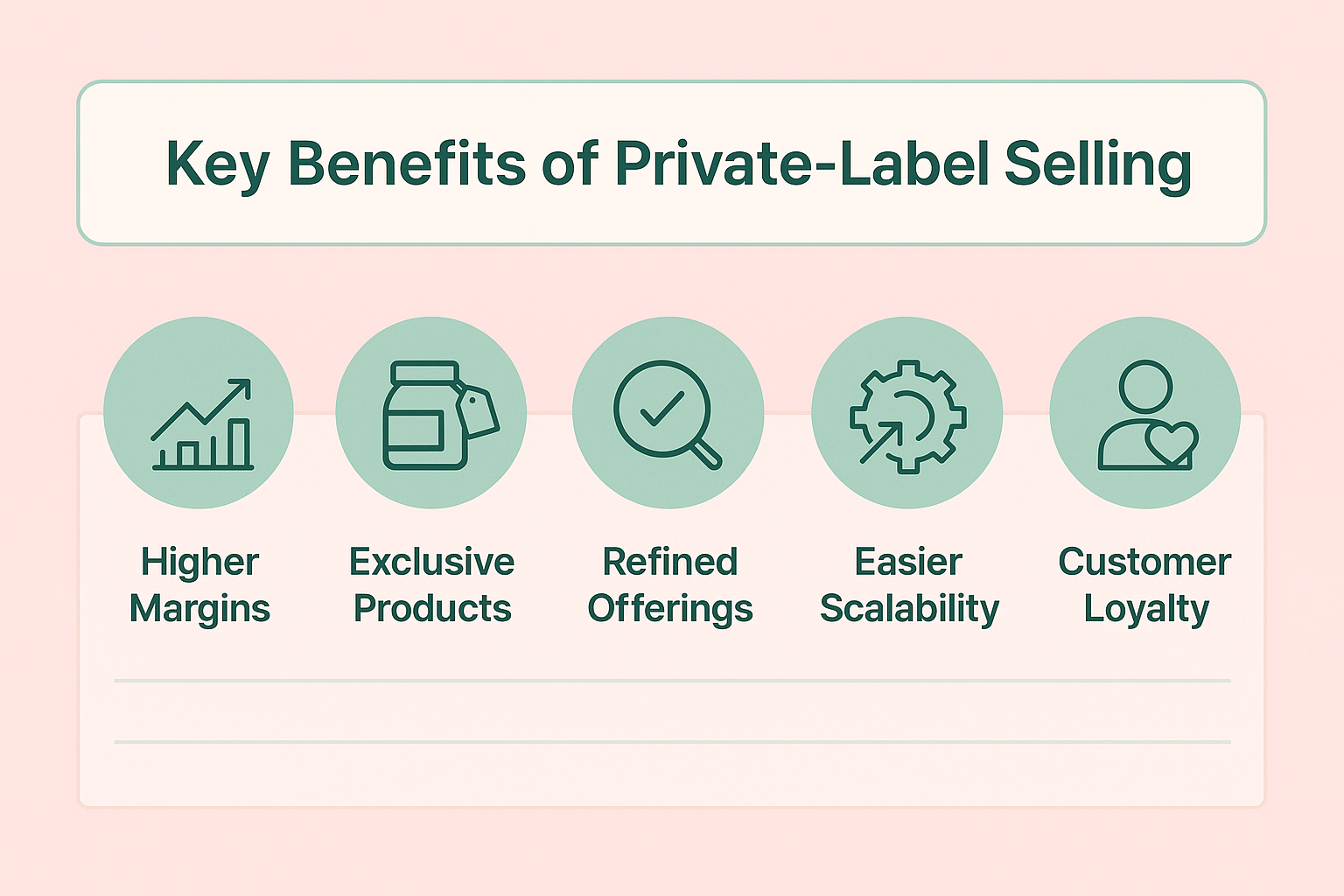
Private label selling offers brands more control, flexibility, and long-term growth potential by outsourcing production while focusing on marketing and buyer experience.
It allows businesses to refine products, strengthen identity, and create a more scalable model than traditional reselling. Here are the key benefits:
Higher Profit Margins
One of the most significant advantages of selling is improved profit margins. Because you’re selling products under your own brand, you have full control over pricing rather than competing against other retailers selling identical items.
This flexibility allows you to:
- Set prices based on brand value, not just cost
- Adjust margins as demand grows
- Capture more revenue as your brand gains recognition
Over time, stronger margins create more room to reinvest in marketing, product improvements, and expansion.
Exclusive Products
Private label selling allows you to offer products that are unique to your brand. Even when using existing formulations, your branding, product presentation, and positioning create a product that competitors can’t replicate exactly.
This exclusivity helps:
- Differentiate your brand in crowded markets
- Reduce direct price comparisons
- Strengthen your overall value proposition
Exclusive products make your brand feel intentional and distinct, rather than interchangeable.
Refined Offerings
Because you control the brand, it makes it easier to refine and improve your product line over time. Customer feedback, reviews, and purchasing behavior can directly inform updates to formulations, product presentation, or product positioning.
This enables brands to:
- Optimize products based on real customer insights
- Introduce variations that meet specific needs
- Phase out underperforming products strategically
Refinement becomes an ongoing process rather than a one-time launch decision.
Easier Scalability
These businesses are designed to scale more efficiently than models that rely on in-house production. With manufacturing handled externally, growth doesn’t require significant operational restructuring.
As demand increases, brands can:
- Expand product lines without building new infrastructure
- Increase order volumes through existing partners
- Enter new markets or sales channels more easily
This scalability allows businesses to grow at a sustainable pace without overwhelming operational complexity.
Stronger Customer Loyalty
Selling under your own brand creates a direct relationship with your target audience. Instead of loyalty being tied to a product alone, it’s built around trust, consistency, and brand experience.
Private label selling supports loyalty by:
- Delivering consistent quality across products
- Creating a recognizable brand that customers return to
- Encouraging repeat purchases through brand trust
Over time, customer loyalty becomes one of the strongest drivers of long-term success and predictable revenue.
Major Drawbacks of a Private Label Business
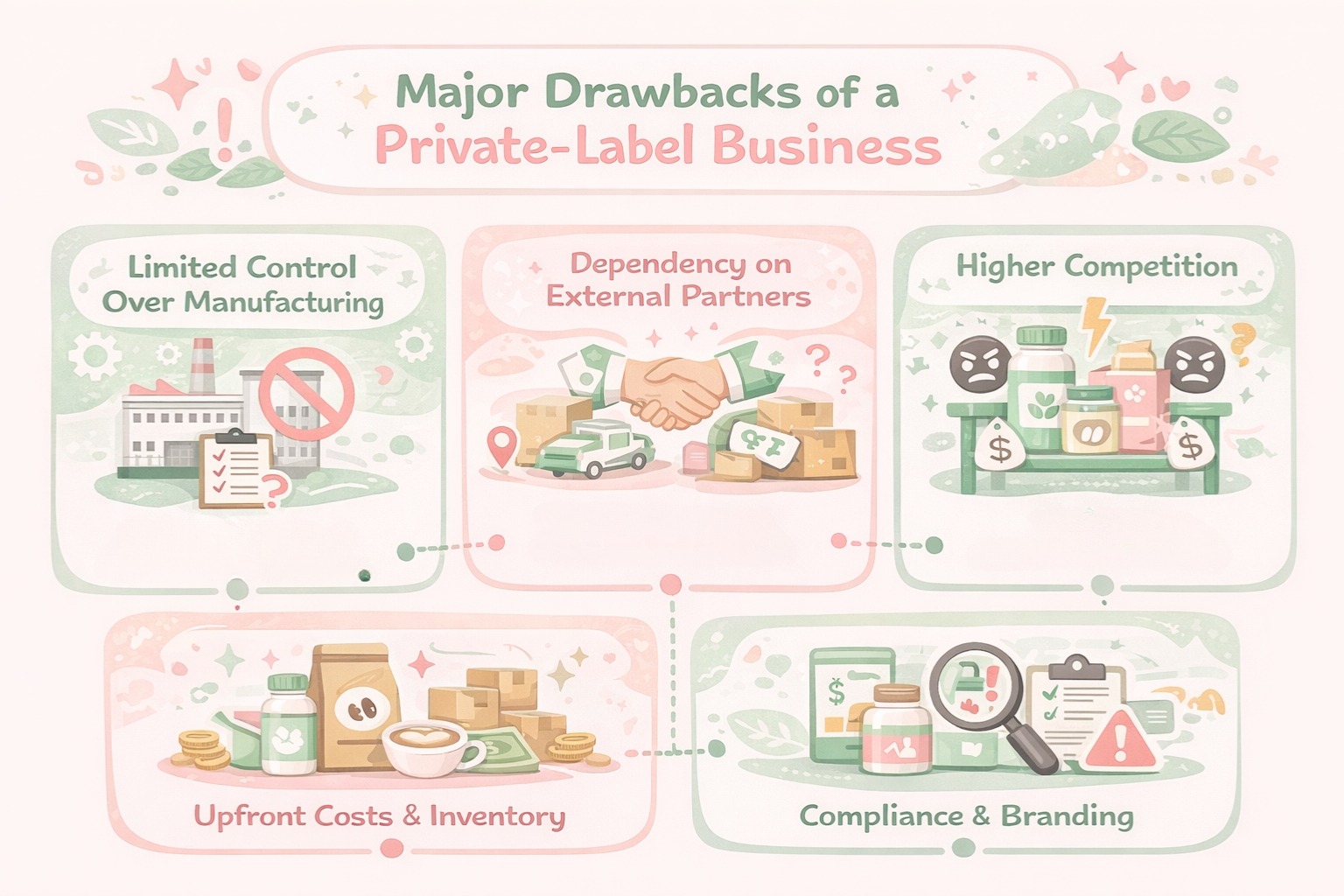
While it offers flexibility and faster entry into the industry, it’s not without challenges. Understanding the potential drawbacks helps you plan more realistically and avoid common pitfalls as you grow your brand.
Limited Control Over Manufacturer Operations
Because production is handled by a third-party manufacturer, you don’t have direct oversight of the day-to-day manufacturing process. This means you rely on your partner for consistency, quality control, and production timelines. If communication isn’t clear or standards aren’t met, it can impact your product and customer trust.
Dependency on External Partners
A private label business depends heavily on manufacturers and fulfillment partners. Delays, supply chain disruptions, or changes in pricing or minimum order quantities can affect your ability to restock or scale.
Switching partners may also require time, testing, and additional investment.
Higher Competition in Popular Niches
Many of these categories attract multiple brands selling similar products.
Without clear differentiation through branding, positioning, or customer experience, it can be difficult to stand out. This often means investing more in strategy, education, and brand storytelling to remain competitive.
Upfront Costs and Inventory Commitments
Although it removes the need for in-house production, it still requires upfront investment. Costs may include product samples, minimum order quantities, packaging, labeling, and compliance-related expenses.
Poor demand forecasting can lead to excess inventory or cash flow pressure.
Responsibility for Compliance and Branding Accuracy
Even though a manufacturer produces the product, the brand owner is typically responsible for labeling accuracy, claims, and customer compliance.
Any errors in packaging, messaging, or positioning can lead to regulatory issues or customer dissatisfaction if not managed carefully.
Longer Lead Times for Changes or Improvements
Making updates to formulas, product presentation, or suppliers often takes time. Compared to reselling finished products, it can involve longer approval cycles for changes, especially when testing, documentation, or new production runs are required.
Industries that Commonly Use Private Label Products
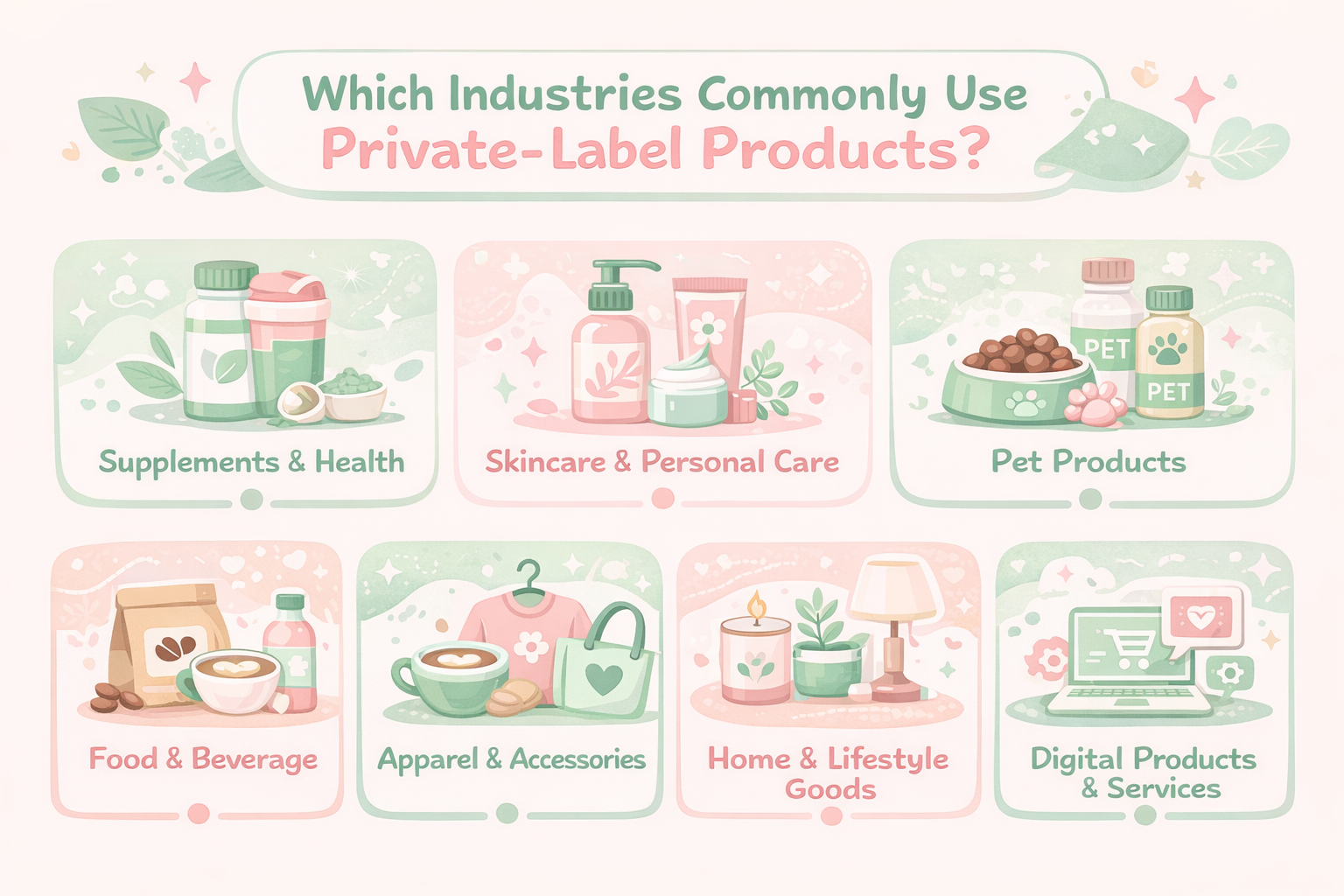
It is used across many industries where speed to market, brand control, and scalability matter. Businesses use this model to introduce products without managing production internally, allowing them to focus on branding and customer experience.
Because of this flexibility, these products appear in both physical and digital markets worldwide.
Below are some of the most common sectors that rely on these products and why the model works so well in each.
Supplements and Health Products
The private label supplement industry is one of the most established markets. Brands commonly launch vitamins, powders, capsules, and functional blends using existing formulations or lightly customized options.
This approach allows businesses to respond quickly to wellness trends while maintaining consistent quality.
It also helps supplement brands concentrate on education, trust-building, and long-term customer relationships rather than complex manufacturing processes.
Why it works in supplements:
- Allows faster entry without in-house formulation
- Supports branding around specific health goals or lifestyles
- Makes it easier to expand product lines over time
Skincare and Personal Care
Private label skincare and personal care brands frequently rely on it to introduce products such as cleansers, serums, moisturizers, and body care items.
The customer rewards strong branding, clear positioning, and ingredient transparency more than entirely new formulations.
It enables brands to refine their identity, test new products efficiently, and scale collections without lengthy development cycles.
Why it works in skincare:
- Established formulas reduce development time
- Packaging and branding drive perceived value
- Easy to create niche-focused product lines
Pet Products
The private label pet care product is a fast-growing category as owners continue to prioritize their pets’ health and well-being. Products often include supplements, grooming items, and daily care solutions designed for repeat use.
It allows pet brands to build trust through consistency and clear benefits while adapting quickly to emerging trends in pet wellness.
Why it works in pet care:
- Strong emotional connection drives brand loyalty
- High demand for wellness and preventative products
- Opportunities for repeat purchases
Food and Beverage
Private label food and beverage products range from packaged snacks to coffee, teas, and functional drinks. In this industry, brand values, sourcing transparency, and product experience play a significant role in purchasing decisions.
It allows businesses to test niche products, adjust flavors or formats, and respond to changing consumer preferences without large production commitments.
Why it works in food and beverage:
- Enables niche positioning (organic, functional, lifestyle-focused)
- Allows quick testing of product ideas
- Supports direct-to-consumer and retail models
Apparel and Accessories
Apparel and accessories are classic private label categories where design and brand identity matter more than production ownership. Brands apply their own labels, designs, and messaging to manufacturer-produced items.
This model allows businesses to release collections quickly, respond to trends, and build strong community-driven brands.
Why it works in apparel:
- Low barrier to entry compared to manufacturing
- Strong focus on branding and audience identity
- Flexible product expansion through collections
Home and Lifestyle Goods
Home and lifestyle products such as décor, candles, and everyday essentials are commonly sold through these models. These items rely heavily on visual appeal, product presentation, and storytelling.
It helps brands create cohesive product lines that fit specific aesthetics or lifestyles while keeping operations streamlined.
Why it works in home goods:
- Products are easy to customize visually
- Packaging adds significant perceived value
- Fits well with ecommerce and boutique retail
Digital Products and Services
Private labeling extends beyond physical goods into digital products and services. Businesses often resell software, strategy tools, or educational content under their own brand.
This approach allows brands to expand their offerings quickly while focusing on sales, support, and positioning rather than technical development.
Why it works in digital services:
- No physical inventory required
- Easy to scale across markets
- Allows brands to expand offerings quickly
Turn Your Private Label Insights Into Action
Understanding how private label works is the first step; putting that knowledge into practice is where real momentum begins. As you define what is a private label brand for your business, you can make more informed decisions about the products you choose and the customers you want to reach.
With the right approach to product selection, manufacturing partnerships, and brand positioning, you can build a foundation that supports growth and long-term success.
Use these insights to clarify your strategy, strengthen your decision-making, and move forward with confidence. Each step you take brings your private-label brand closer to the target audience and to the customers you’re ready to serve.
FAQ
Related blogs
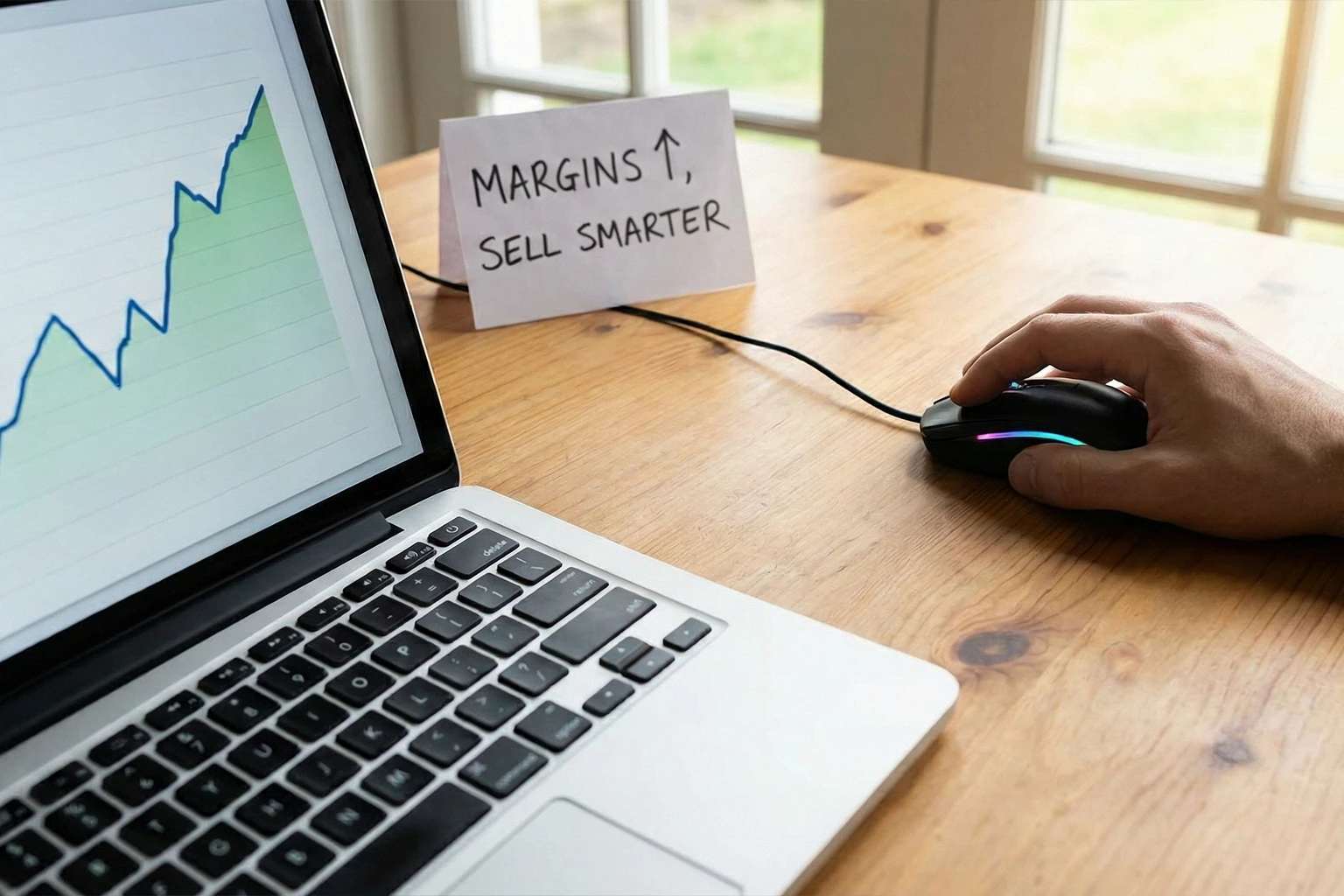
Dynamic Pricing Calculator: Optimize Margins and Sell Smarter With Every Click
.avif)
Safety Stock Calculator: Instantly Find the Right Buffer Stock for Any Product
.avif)
Cart Abandonment Rate Calculator: Understanding and Maximizing Your E-Commerce Conversions
.avif)

